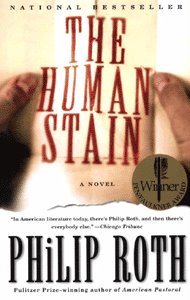The stain in us all
Certain journalistic duties will bring me to Rockwell tomorrow, which means I'll be resisting temptation as I take the inevitable side trip to Fully Booked. For those with better budgets for book purchases, I offer this recommendation.

MV recommends:
The Human Stain
By Philip Roth
Winner of the Pen/Faulkner Award
THE HUMAN STAIN completes Philip Roth’s trilogy of novels featuring his alter ego writer Nathan Zuckerman. I have yet to read the first two books (American Pastoral and I Married a Communist), but each book stands alone; not having read the other books doesn’t take away anything from The Human Stain. This has easily become one of my favorite books.
Coleman Silk, the protagonist, is a former dean and classics professor who is forced to resign because of being accused of using a racial slur in class. His dismissal continues the whirlwind of a life he has had.
Zuckerman meets Silk, who is his neighbor, a couple of years after Silk was forced to resign. Silk had lost his wife and he’s convinced that it’s the university that “killed” her for she could not live with such an accusation being pointed at her husband. The loss of a job and the loss of a wife send Silk into despair.
He starts an affair with an illiterate college janitor, Faunia Farley, which revitalizes the old professor’s life. When Delphine Roux, the young, bitter new dean of the university (who owes much of her success to Silk) finds out about the affair, she condemns him for taking advantage of the younger janitor.
The whole story becomes deeply ironic. We learn of Silk’s past. We learn that he is a light-skinned African-American who has managed to survive discrimination by pretending to be a white Jew for most of his adult life. Eventually, he loses his job for allegedly being a discriminate against African-Americans and yet he is an African-American.
Silk’s been fighting against racism his whole life and yet he denies his own race. He has chosen to live his life as a white man; therefore, he himself manifests racism. This is the complex “stain” that has haunted him his entire life. In trying to be a fair, just, and noble man, he has been living a lie.
And this is not the only “stained” character Roth gives us. All the principle characters have pasts that haunt them, things they’ve denied, and things that they’ve allowed to consume them.
Faunia comes from a childhood of molestation and an abusive marriage. Les Farley, the abusive ex-husband, is a deranged Vietnam vet who stalks Faunia and Silk. Roux is an over-achieving immigrant from Europe who is confused about her feelings towards a professor she is condemning.
They are all stained.
The characters are so deeply discussed, so diligently investigated, that we don’t question their motives as individuals, rather the messed up milieu they’ve lived in.
It’s a milieu we all live in. It’s reality. It’s this world.
It’s the stain in us all.
Certain journalistic duties will bring me to Rockwell tomorrow, which means I'll be resisting temptation as I take the inevitable side trip to Fully Booked. For those with better budgets for book purchases, I offer this recommendation.

MV recommends:
The Human Stain
By Philip Roth
Winner of the Pen/Faulkner Award
THE HUMAN STAIN completes Philip Roth’s trilogy of novels featuring his alter ego writer Nathan Zuckerman. I have yet to read the first two books (American Pastoral and I Married a Communist), but each book stands alone; not having read the other books doesn’t take away anything from The Human Stain. This has easily become one of my favorite books.
Coleman Silk, the protagonist, is a former dean and classics professor who is forced to resign because of being accused of using a racial slur in class. His dismissal continues the whirlwind of a life he has had.
Zuckerman meets Silk, who is his neighbor, a couple of years after Silk was forced to resign. Silk had lost his wife and he’s convinced that it’s the university that “killed” her for she could not live with such an accusation being pointed at her husband. The loss of a job and the loss of a wife send Silk into despair.
He starts an affair with an illiterate college janitor, Faunia Farley, which revitalizes the old professor’s life. When Delphine Roux, the young, bitter new dean of the university (who owes much of her success to Silk) finds out about the affair, she condemns him for taking advantage of the younger janitor.
The whole story becomes deeply ironic. We learn of Silk’s past. We learn that he is a light-skinned African-American who has managed to survive discrimination by pretending to be a white Jew for most of his adult life. Eventually, he loses his job for allegedly being a discriminate against African-Americans and yet he is an African-American.
Silk’s been fighting against racism his whole life and yet he denies his own race. He has chosen to live his life as a white man; therefore, he himself manifests racism. This is the complex “stain” that has haunted him his entire life. In trying to be a fair, just, and noble man, he has been living a lie.
And this is not the only “stained” character Roth gives us. All the principle characters have pasts that haunt them, things they’ve denied, and things that they’ve allowed to consume them.
Faunia comes from a childhood of molestation and an abusive marriage. Les Farley, the abusive ex-husband, is a deranged Vietnam vet who stalks Faunia and Silk. Roux is an over-achieving immigrant from Europe who is confused about her feelings towards a professor she is condemning.
They are all stained.
The characters are so deeply discussed, so diligently investigated, that we don’t question their motives as individuals, rather the messed up milieu they’ve lived in.
It’s a milieu we all live in. It’s reality. It’s this world.
It’s the stain in us all.


0 Comments:
Post a Comment
<< Home